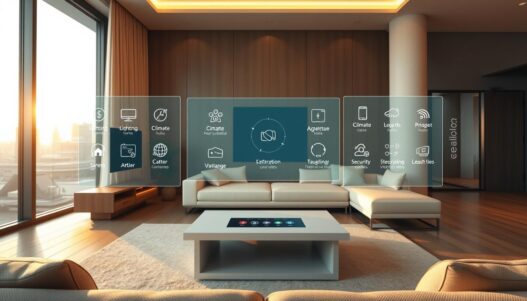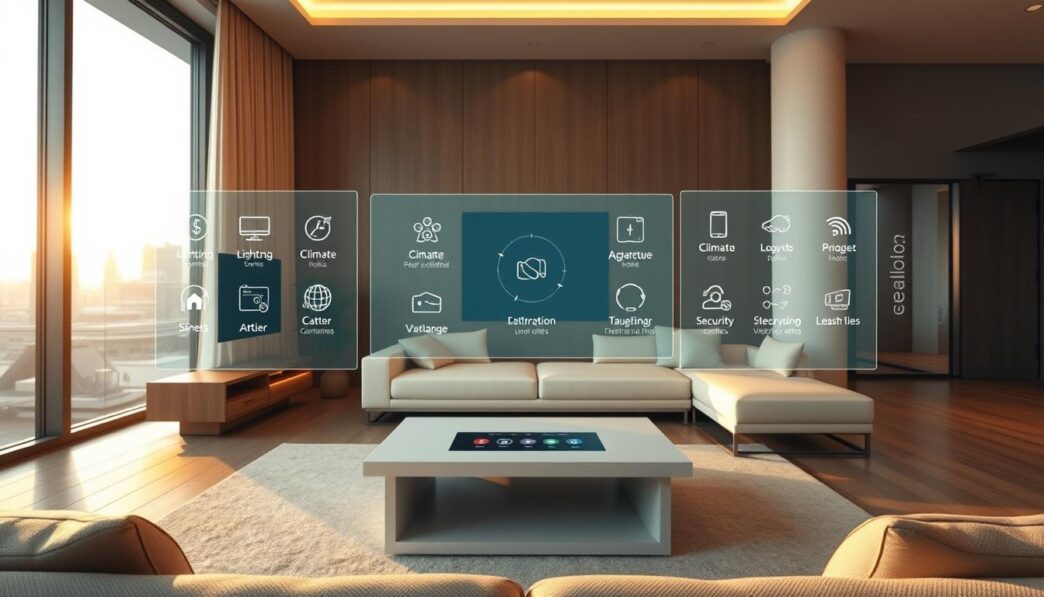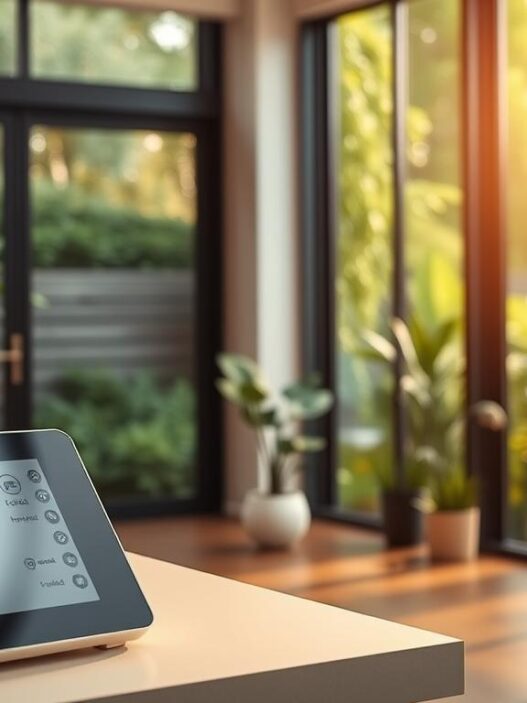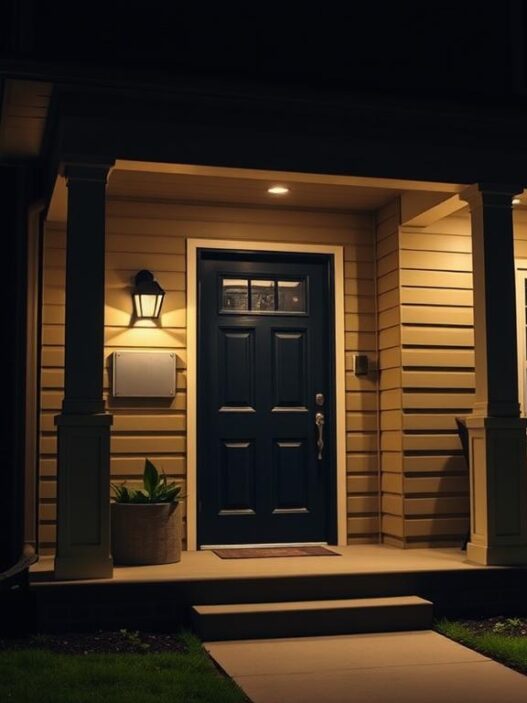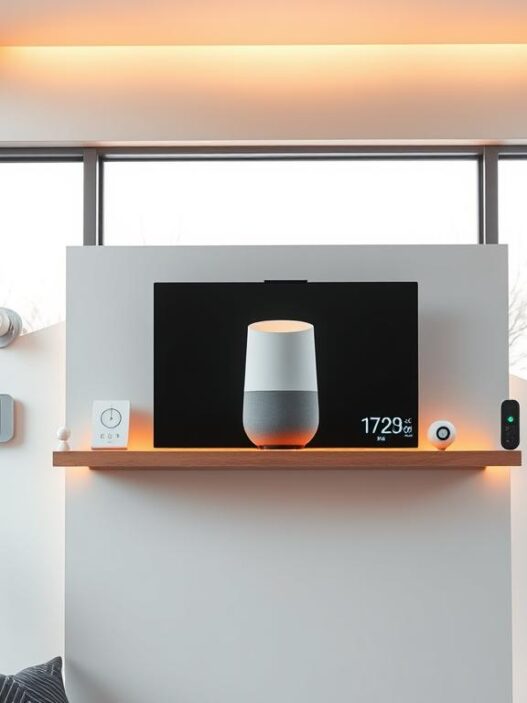Smart home tech has changed how we live, making homes more convenient, safe, and energy-smart. It uses artificial intelligence and home automation for a smooth living experience. The smart home idea has grown a lot, and 2025 will see even more new trends and innovations.
Smart home tech aims to make our homes comfortable and safe. Home automation is key, letting us control our homes easily. The latest trends in 2025 focus on making our lives more personal and efficient, exciting for smart home fans.
Looking at the latest smart home tech trends, home automation leads the way. From smart thermostats to smart lights, the options are vast. With more people wanting smart homes, keeping up with new tech is crucial.
Key Takeaways
- Smart home technology is revolutionizing the way we live
- Home automation is a key aspect of smart home technology
- Artificial intelligence is being integrated into smart home systems
- Smart home technology is focused on providing a convenient and secure living experience
- The latest trends in 2025 are expected to bring more innovative and personalized solutions
The Evolution of Smart Home Technology in Recent Years
Smart home tech has changed a lot over the years. It has moved from simple automation to advanced AI systems. This change is thanks to better connected devices and our need for easy, efficient, and safe homes.
Now, smart home tech is a big part of our lives. It changes how we use our homes and gadgets.
Connected devices make it easy to control and watch our homes. Smart home technology has brought new products like voice assistants and smart thermostats. These have changed how we manage our homes.
Some key features of smart home tech include:
- Energy efficiency and automation
- Enhanced home security and surveillance
- Convenient voice control and smart assistants
- Integration with connected home devices
As smart home tech keeps getting better, we’ll see even more cool stuff. With more connected devices and smart tech, it’s key to keep up with the latest news.
Revolutionary AI Integration in Home Systems
Artificial Intelligence (AI) has changed how we live and interact with our homes. Thanks to iot devices, homes are now more intuitive and responsive. AI systems can learn and adapt, making our homes more personalized and automated.
AI in smart homes can learn and predict our behavior. For instance, a smart thermostat can adjust the temperature based on our schedule and preferences. This makes our homes more comfortable and helps save energy.
- Voice assistants that can control multiple devices and systems
- Predictive maintenance that can detect and prevent equipment failures
- Personalized recommendations for energy efficiency and comfort
AI is making smart homes more convenient, efficient, and fun. As AI technology grows, we’ll see even more exciting uses in smart homes.
Advanced Voice Control and Natural Language Processing
Advanced voice control and natural language processing are changing how we talk to our homes. They make smart home integration and home security systems work better together. This means we can control our homes easily and safely.
This technology lets us talk to our homes in a way that feels natural. It’s because of big steps forward in contextual understanding. Now, our smart home devices can understand us better, making our lives easier.
Some great things about advanced voice control and natural language processing in home security systems are:
- They make our homes more secure and convenient.
- They let us control our smart home devices smoothly.
- They improve how we experience living in our homes.
By adding advanced voice control and natural language processing to smart home integration and home security systems, our homes become better places to live. As this tech gets even better, we’ll see even more cool things in the future.
Smart Energy Management Solutions
Smart energy management is key in smart homes, aiming to cut down energy use and waste. A smart home hub is crucial, linking with devices for real-time monitoring and control. This lets people see how much energy they use, find where it’s wasted, and lower their bills.
Using smart energy solutions, people can save a lot on their bills and help the planet. The smart home hub connects and controls devices like thermostats and lights. This lets devices talk to each other, saving energy automatically.
Some main benefits of smart energy solutions are:
- Real-time energy monitoring and control
- Automated energy-saving strategies
- Personalized energy usage recommendations
- Integration with renewable energy sources
As smart homes grow, so will the need for smart energy solutions. Getting a smart home hub and devices is a big step towards a greener, more efficient home.
Enhanced Home Security and Surveillance Systems
Homeowners today want their homes to be safe and secure. An automated home offers advanced safety and surveillance solutions. This gives residents peace of mind, even when they’re away.
Some key features of these systems include:
- Biometric access control, which uses unique identifiers like fingerprints or facial recognition to grant access
- AI-powered threat detection, which can spot potential threats and alert homeowners
- Remote monitoring capabilities, which let homeowners watch their property from anywhere
These features create a strong security system. It protects homes and gives residents peace of mind. By choosing an automated home with these features, homeowners enjoy intelligent living while keeping their property and loved ones safe.
Connected Kitchen and Appliance Intelligence
The kitchen is the heart of the home. With smart technology, it’s now smarter and more efficient. Digital home innovations are changing how we cook, store food, and handle waste.
Connected kitchen features include automated cooking systems and smart refrigerators. These are made possible by smart technology and digital home innovations. They allow appliances and devices to talk to each other smoothly.
For instance, a smart fridge can order groceries when they’re low. It uses digital home tech to connect to online stores. An automated cooking system can adjust cooking times and temperatures for different foods, thanks to smart technology.
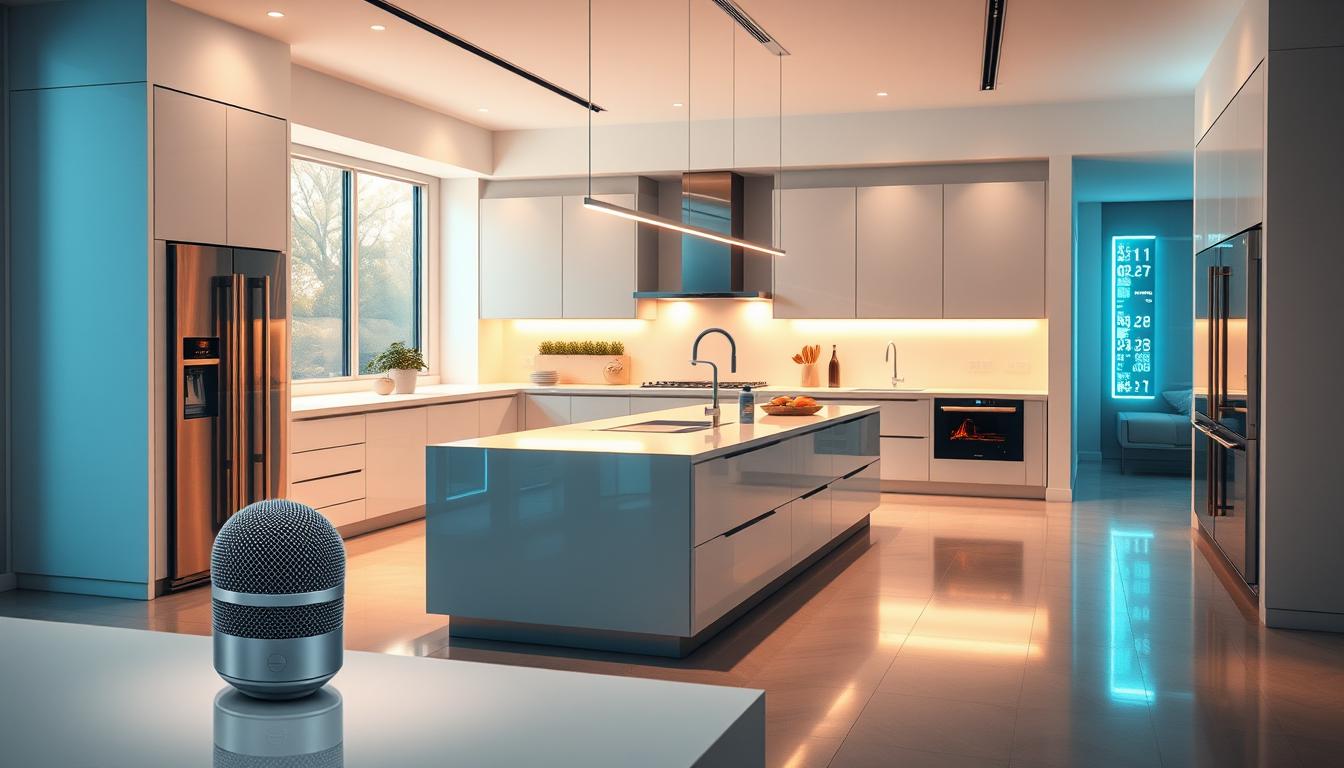
The kitchen is becoming easier, more efficient, and fun with smart technology and digital home innovations. As these technologies grow, we’ll see even more cool solutions for the connected kitchen.
Health and Wellness Monitoring Integration
Smart homes are now focusing more on health and wellness. They use smart devices and home control tech to make living spaces healthier. This includes tracking environmental quality, personal health, and sleep.
Environmental quality control is a big part of this. It uses smart devices to check air, temperature, and humidity levels. For example, some smart thermostats can change the air if it’s not good.
Personal Health Tracking Features
- Heart rate and blood pressure monitoring
- Activity tracking and fitness goals
- Nutrition and meal planning guidance
Home control systems also track personal health. They can monitor heart rate, blood pressure, and activity. This helps people make better health choices.
Benefits of Integrated Health and Wellness Monitoring
Integrating health tracking into smart devices and home control brings many benefits. It can improve health, boost energy, and better mental health. As tech advances, we’ll see even more health monitoring options.
Smart Entertainment and Media Control
Smart home technology has changed how we enjoy entertainment at home. Now, we can control our music, video, and games easily. For example, smart TVs let us change channels and adjust the volume with just our voice.
Smart appliances like sound systems and gaming consoles can connect to the internet. This lets us stream movies, play online games, and even control our lights and temperature.
Some key benefits of smart entertainment and media control are:
- Convenience: We can control our systems from anywhere in the house, using our phones or voice assistants.
- Personalization: Smart appliances learn our preferences, suggesting movies, TV shows, and music just for us.
- Energy efficiency: They can turn off automatically when not in use, saving energy and money.
In summary, smart entertainment and media control make our lives easier and more fun. With new smart appliances coming out, we can look forward to even more exciting features.
Sustainable Living Through Smart Home Innovation
Smart home technology is all about sustainable living. It aims to cut down energy use and encourage green habits. By using smart home systems, people can help the planet. These systems learn and adjust to how much energy a home uses.
Some key features of smart home systems that support sustainable living include:
- Automated lighting and temperature control
- Energy-efficient appliance integration
- Real-time energy usage monitoring
- Personalized energy consumption recommendations
These features help homes use less energy and produce less carbon. For example, a U.S. Department of Energy study showed smart homes can cut energy use by up to 30%. They also help save water and reduce waste.
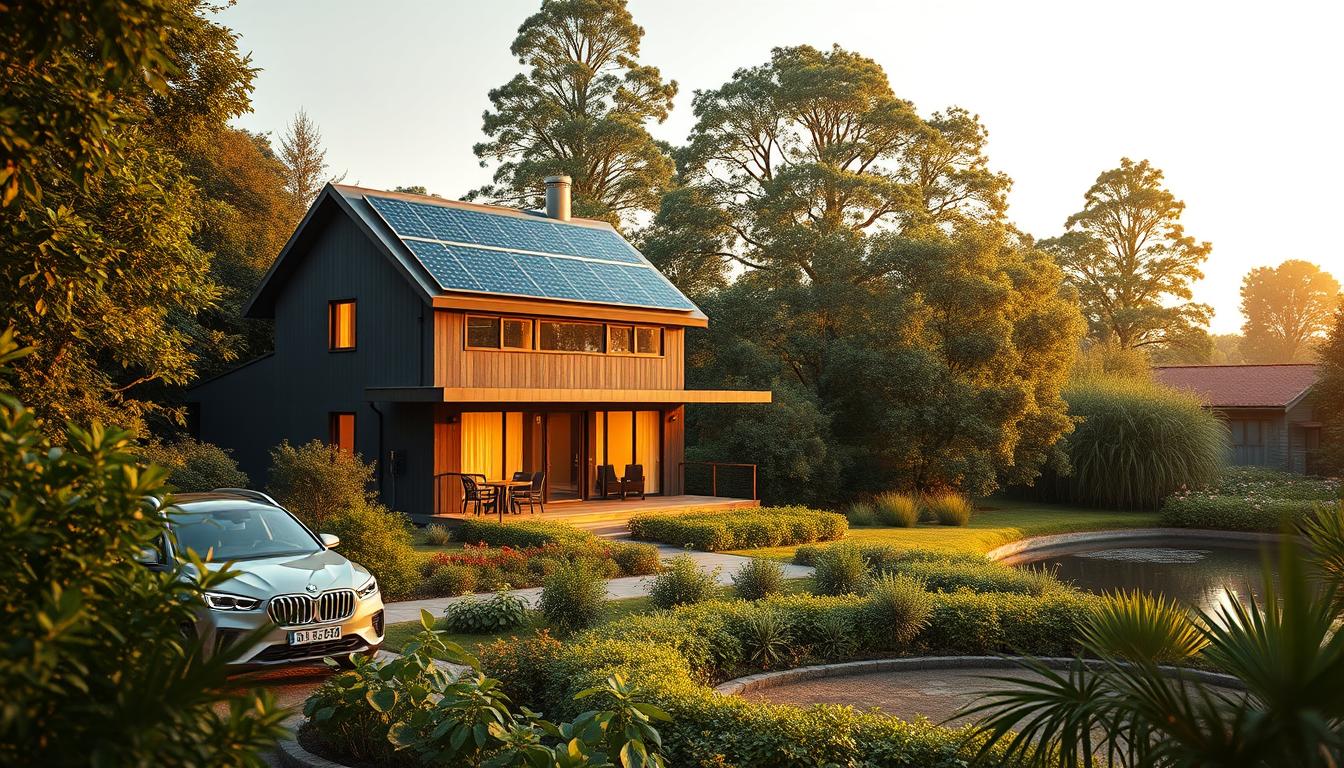
Smart home tech is key to a greener future. By using these innovations, we can make our homes more eco-friendly. This benefits our planet for years to come.
| Smart Home Feature | Energy Savings | Environmental Impact |
|---|---|---|
| Automated Lighting | 20-30% | Reduced carbon emissions |
| Energy-Efficient Appliances | 30-50% | Reduced water usage |
| Real-Time Energy Monitoring | 10-20% | Increased recycling rates |
The Future of Smart Home Hub Integration
Smart home technology is getting better, and the smart home hub is key. It will help manage and improve home systems for a greener future. Homeowners will use one platform to track and control energy, water, and waste.
The smart home hub’s future is about making homes sustainable. It will use AI and machine learning to save energy, cut waste, and support green living integration. Some important features will include:
- Energy management systems that optimize energy consumption and reduce waste
- Water conservation systems that monitor and control water usage
- Waste reduction technologies that help minimize waste and promote recycling
- Integration with renewable energy sources such as solar and wind power
By adding waste reduction technologies and green living integration to smart home hubs, homes can be more eco-friendly. As people want to live more sustainably, the future of smart home hubs is bright.
Integration Challenges and Solutions
Smart home technology faces a big hurdle: integration challenges. With many devices and systems out there, making them work together is tough. But, there are solutions to make it easier.
Common integration challenges include compatibility issues and setup problems. Troubleshooting can also be a challenge. Many turn to professional installation for a smooth smart home experience.
Standardization is key to successful integration. Choosing devices that follow industry standards helps. Also, many manufacturers focus on interoperability, making it easier for different brands to work together.
There are many solutions for integration challenges. Some popular ones include:
- Smart home hubs that connect and control multiple devices
- Professional installation services for setup and configuration
- Online resources and forums for troubleshooting tips
By knowing the integration challenges and exploring solutions, homeowners can create a smart home that meets their needs. It will offer a seamless and efficient experience.
Conclusion: Embracing the Smart Home Revolution
The smart home revolution has changed how we live, work, and interact with our homes. It has brought in new technologies like AI, voice control, and energy management. These advancements have made our lives more convenient, secure, and sustainable.
By joining the smart home revolution, homeowners gain many benefits. They get better energy use, personalized comfort, and easy control over devices. As technology keeps improving, it’s important for people to keep up with the latest smart home technology trends. This way, they can make the most of this exciting change.
While making a smart home can be challenging, the benefits are worth it. By choosing the right technology and working with reliable providers, homeowners can make their homes smarter and more eco-friendly. The future of smart homes looks promising. Those who start now will enjoy a more connected and intelligent living space.
FAQ
What is the current state of the smart home market?
The smart home market has grown a lot lately. It now includes many connected devices, artificial intelligence, and IoT technologies. Big names in the field keep coming up with new ways to make homes more convenient, secure, and efficient.
How has AI integration transformed smart home systems?
Artificial Intelligence (AI) has changed smart homes a lot. It makes them more aware of what people need. AI systems can learn and change, giving personalized experiences and improving home automation, like voice assistants and predictive maintenance.
What are the advancements in voice control and natural language processing in smart homes?
Voice control and natural language processing have gotten a lot better. This makes talking to smart homes easier and more secure. Now, smart homes can understand different languages and know the context, making them more accessible and safe, especially with home security systems.
How do smart home technologies contribute to energy management and sustainability?
Smart homes help manage energy well. They work with devices to monitor and control energy use. This helps cut down on waste and lower energy bills, making homes more sustainable.
What are the key features of enhanced home security and surveillance systems in smart homes?
Smart homes have better security and surveillance now. They include biometric access, AI threat detection, and remote monitoring. These features keep homes safe, even when people are not there.
How are smart home technologies transforming the kitchen and home appliances?
Smart kitchen and appliance technology is changing cooking and food storage. Smart refrigerators and automated cooking systems make kitchens more efficient. This improves the home living experience.
What are the health and wellness benefits of smart home integration?
Smart homes can help with health and wellness. They control the environment, track personal health, and improve sleep. These features create a healthier home environment.
How do smart home technologies enhance the entertainment and media experience?
Smart home tech makes entertainment better. It offers easy control over music, video, and games. From smart TVs to voice-controlled sound systems, entertainment is getting smarter and more connected.
What are the challenges and solutions in integrating smart home systems?
Smart homes offer many benefits but also have integration challenges. Issues include standardization, interoperability, and professional installation. Knowing these challenges helps ensure a smooth smart home experience.








